Hair care is an essential part of our daily routine, and it's crucial to pay attention to the ingredients in the products we use. However, many hair care products contain harsh chemicals that can damage our hair and scalp in the long run. In this blog post, we will be discussing the most common hair care ingredients to avoid and why they are harmful.
Popular hair care ingredients to avoid
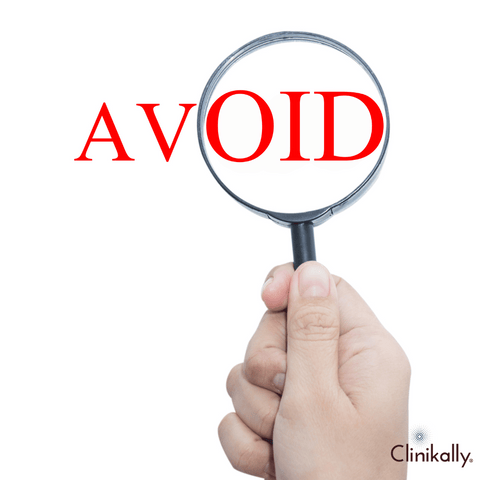
Effective hair care is important, but it is just as important to buy hair care products that are safe. Often, the suitability of hair care ingredients and products depends on scalp type and hair concerns, and using the wrong ingredient to reduce hair fall or prevent hair loss can lead to more damage than good. So, it is best to use dermatologist-recommended hair growth serum or other hair care products.
- Sulfates: Sulfates are a type of surfactant commonly used in shampoos and other hair care products to create a lather. They are known to strip the hair of its natural oils, making it dry and brittle. Sulfates can also irritate the scalp and lead to hair loss.
- Parabens: Parabens are a type of preservative used to extend the shelf life of hair care products. They are known to disrupt hormone levels and have been linked to cancer.
- Mineral Oil: Mineral oil is a type of by-product obtained from petroleum and is commonly used as a moisturizer in hair care products. It is known to clog the hair follicles, leading to hair loss and scalp irritation.
- Silicones: Silicones are a type of synthetic polymer commonly used in hair care products to provide a smooth and silky finish. They can build up on the hair and scalp, making it difficult for the hair to absorb moisture and leading to hair damage.
It's crucial to remember that different people will react differently to these elements, and not everyone may have problems with them. Furthermore, a hair care product's general formulation can affect its benefits because it frequently contains a combination of chemicals. Knowing one's sensitivities and trying out various products might help people figure out which substances are best for their hair and scalp. For individuals looking for softer formulations, reading product labels and selecting substitutes marked as "sulfate-free," "paraben-free," or "silicone-free" may be helpful.
Harmful hair care ingredients for men
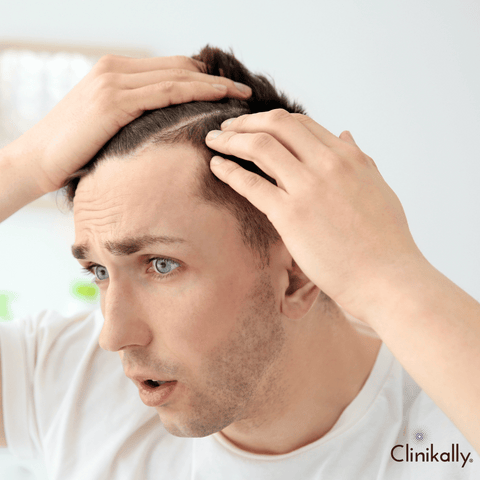
Hair care for men is just as important as it is for women. However, men's hair care products often contain different ingredients than those marketed to women. Some harmful hair ingredients for men to avoid include:
-
Alcohol: Many hair care products contain alcohol, which can dry out the hair and scalp, leading to irritation and dandruff.
-
Fragrance: Many hair care products contain synthetic fragrances, which can cause allergic reactions and skin irritation.
-
Dyes: Many hair coloring products contain harsh chemicals that can damage the hair and scalp. They can lead to hair loss, dryness, and breakage.
-
Parabens: Parabens are a type of preservative used to extend the shelf life of hair care products. They are known to disrupt hormone levels and have been linked to cancer.
Men need to be mindful of the ingredients in their hair care products and avoid those that are known to be harmful. Always read the ingredients label before buying any hair care product, and if you have any doubts or concerns, consult a hair care professional.
Harmful hair care ingredients for women
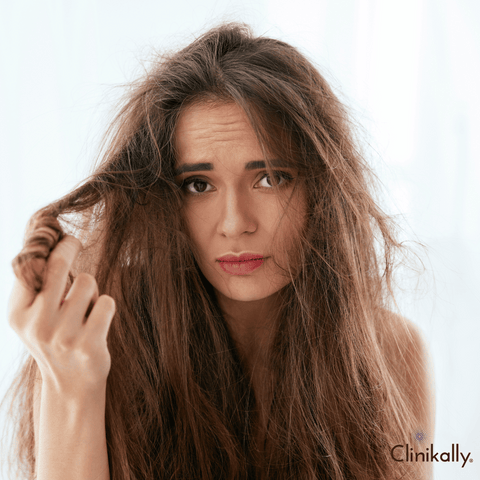
Hair care is an essential part of a woman's daily routine, but it's crucial to be mindful of the ingredients in the products we use. Some harmful hair ingredients for women to avoid include:
-
Sulfates: Sulfates are a type of surfactant commonly used in shampoos and other hair care products to create a lather. They are known to strip the hair of its natural oils, making it dry and brittle. Sulfates can also cause irritation to the scalp and lead to hair loss.
-
Parabens: Parabens are a type of preservative used to extend the shelf life of hair care products. They are known to disrupt hormone levels and have been linked to cancer.
-
Mineral Oil: Mineral oil is a type of by-product obtained from petroleum and is commonly used as a moisturizer in hair care products. It is known to clog the hair follicles, leading to hair loss and scalp irritation.
-
Silicones: Silicones are a type of synthetic polymer commonly used in hair care products to provide a smooth and silky finish. They can build up on the hair and scalp, making it difficult for the hair to absorb moisture and leading to hair damage.
It is important to be mindful of the ingredients in our hair care products and avoid those that are known to be harmful. By switching to natural alternatives, we can ensure that our hair is getting the proper care and nourishment it needs to stay healthy and strong. Always read the ingredients label before buying any hair care product, and if you have any doubts or concerns, consult a hair care professional.
Sulfates and their effects on hair health
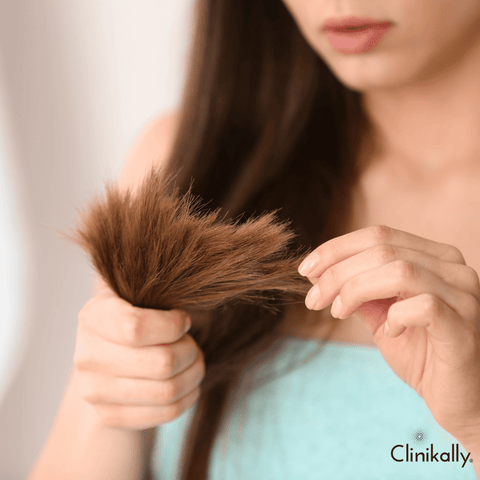
Sulfates are cleansing agents found in many shampoos and hair care products. Common sulfates in hair care products include sodium lauryl sulfate (SLS) and sodium laureth sulfate (SLES). While sulphates clean the hair effectively by removing dirt, oil, and product buildup, they can have both positive and negative effects on hair health:
Positive Effects:
-
Efficient Cleansing: Sulphates are strong surfactants that produce froth and efficiently rid the hair and scalp of debris, oil, and pollutants, leaving them feeling fresh.
-
Product Buildup Removal: Sulphates can effectively remove styling product residues, excess oil, and pollutants from the hair, preventing buildup that can weigh hair down.
Negative Effects:
-
Stripping Natural Oils: Sulfates can be harsh on the scalp and hair, stripping away natural oils. This can cause dryness, irritation, and scalp sensitivity, especially in people who have sensitive or dry scalp.
-
Hair Damage: Continued use of sulfates can cause damage to the hair cuticle, leading to dry, brittle, and frizzy hair. This damage may make the hair more prone to breakage and split ends.
-
Color Fading: Sulfates may contribute to the fading of color-treated hair by stripping away hair dye or pigment, causing the color to fade more quickly.
-
Scalp Irritation: Sulfates can sometimes cause irritation, itching, or redness on the scalp, particularly for individuals with sensitive skin or certain scalp conditions.
Sulfate-free shampoos and hair care products may be a better choice for people with sensitive scalps or hair that is prone to dryness or damage. Sulfate-free products use different cleansing agents or milder surfactants that are less likely to remove natural oils from the hair and scalp. It is crucial to remember that while sulphates may not be good for everyone, they can have negative effects on some people. How hair responds to sulphates can vary depending on hair type, scalp health, and personal sensitivity. It is important to take your hair type, scalp health, and personal preferences into account when selecting hair care products. If you experience dryness or irritation on your scalp due to sulphates, you should try sulfate-free alternatives and seek advice from a dermatologist or hair care specialist for specific recommendations.
Parabens and hair damage
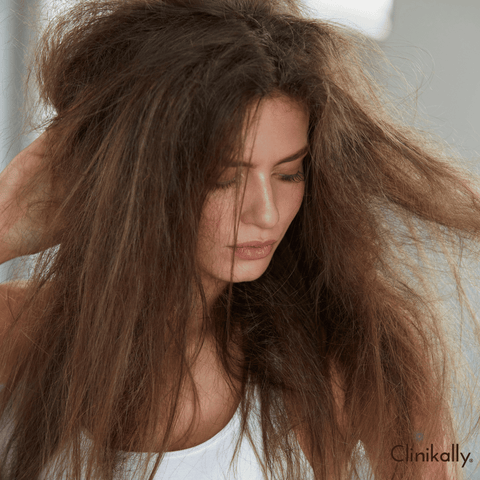
Parabens are a type of preservative that is commonly used in cosmetic and personal care products such as shampoos, conditioners, and hair styling products to prevent the growth of bacteria, mould, and yeast. While parabens have long been used as preservatives, there has been some concern about their potential effects on health, including hair health. There is no substantial evidence directly linking parabens to hair damage. However, some studies and anecdotal evidence suggest that parabens may contribute to certain scalp and hair issues:
-
Scalp Sensitivity: Parabens, especially in individuals with sensitive skin or scalp conditions like dermatitis or eczema, can cause scalp irritation, redness, itching, or dryness.
-
Allergic Reactions: Some individuals may be allergic or sensitive to parabens, leading to adverse reactions such as contact dermatitis or allergic contact eczema.
-
Hair Quality: Parabens might contribute to dryness or dullness of the hair in some cases. Excessive use of products containing parabens might strip the hair of natural oils, leading to dryness or brittleness.
-
Potential Endocrine Disruption: Parabens have been studied for their potential to mimic estrogen and disrupt the endocrine system. Although conclusive evidence about their direct impact on hair health is lacking, concerns about their overall health effects persist.
Some people would rather use hair care products without parabens because of the concerns that have been raised regarding them. Choosing products without parabens may be especially important for people who have sensitive scalps or are looking for less artificial ingredients. When selecting hair care products, seek out "paraben-free" labelling or investigate lines of natural and organic goods. It is imperative to acknowledge that the lack of parabens does not ensure the overall safety or efficacy of a product. Parabens may be substituted with other preservatives or chemicals, and their effects on hair health may differ. For a correct diagnosis and advice on appropriate hair care products, people who are suffering from scalp irritation or hair concerns that they believe may be related to particular components should think about consulting a dermatologist or other healthcare professional.
Natural alternatives for effective hair growth
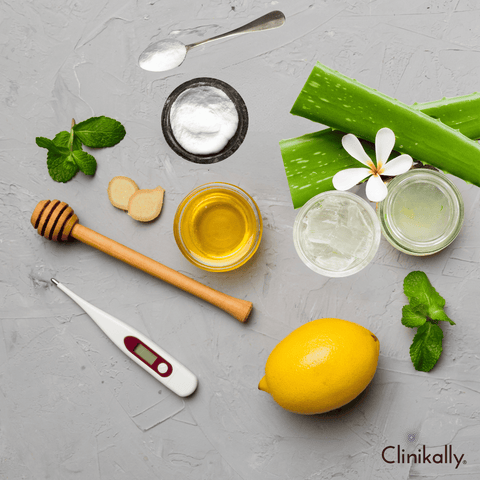
You can try many home remedies for hair fall that are also recommended by hair care experts and dermatologists. These are safe and effective, and often easy to use.
-
Coconut Oil: Coconut oil for hair growth is known for its moisturizing properties and is a great alternative to mineral oil. It can penetrate the hair shaft and help strengthen the hair from within.
-
Aloe Vera: Aloe vera is known for its soothing properties and is a great alternative to parabens. It can help soothe the scalp and prevent hair loss.
-
Castor Oil: Castor oil is known for its thickening properties and is a great alternative to silicones. It can help thicken hair and prevent hair loss.
-
Apple Cider Vinegar: Apple cider vinegar is known for its clarifying properties and is a great alternative to sulfates. It can help remove build-up from the hair and scalp, leaving it clean and refreshed.
You may use these natural substitutes in a variety of ways, such as by mixing them into your hair care products, applying them straight to the scalp and hair, or making hair masks. Before using them extensively, it's important to monitor reactions and conduct patch testing because individual responses may differ. Natural treatments can support a good hair care regimen, although they might not show benefits right away or with certainty. Over time, balanced nutrition, enough hydration, frequent cutting, and less heat treatment can all help promote healthy hair development. Seeking individualised guidance and treatment alternatives from a healthcare professional is recommended for individuals who are dealing with significant hair loss or scalp problems.
Organic oils for hair nourishment
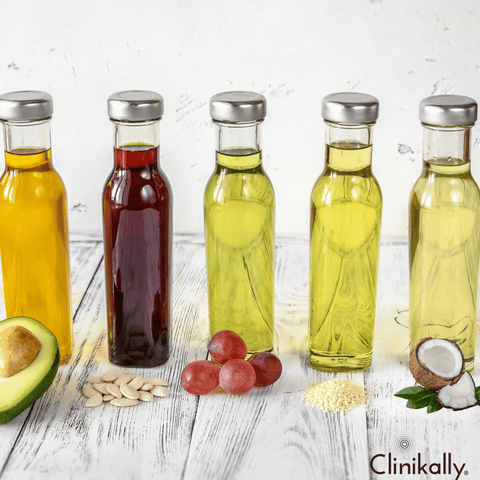
Because of their inherent qualities and high concentration of vitamins, antioxidants, and fatty acids, organic oils can offer hair exceptional sustenance. The following organic oils are well-known for strengthening hair:
-
Coconut Oil: Known for its moisturising properties, coconut oil penetrates the hair shaft, reducing protein loss and strengthening hair. It is suitable for all hair types and aids in the management of frizz and dryness.
-
Argan Oil: Argan oil moisturises and nourishes the hair, promoting shine and smoothness. It is high in antioxidants, vitamins, and fatty acids. It is especially beneficial for damaged or brittle hair.
-
Jojoba Oil: Jojoba oil, which is similar to the natural sebum produced by the scalp, regulates oil production, moisturises the hair without leaving a greasy residue, and promotes hair strength.
-
Olive Oil: Packed with antioxidants and vitamins, olive oil is ideal for deep conditioning and moisturising dry or damaged hair. It can improve the elasticity and shine of your hair.
-
Avocado Oil: Avocado oil, which is high in vitamins A, D, and E as well as essential fatty acids, nourishes and moisturises the hair while increasing strength and vitality.
-
Sweet Almond Oil: Sweet almond oil is lightweight and easily absorbed, and it moisturises the hair, prevents breakage, and promotes hair growth.
-
Castor Oil: Rich in ricinoleic acid, which helps nourish the scalp, promote hair growth, and reduce hair fall, castor oil is known for its hair-strengthening properties.
-
Rosehip Oil: Rosehip oil, which is high in vitamins, antioxidants, and essential fatty acids, can hydrate the hair and scalp, reduce frizz, and improve hair texture.
When using organic oils to nourish your hair, remember to:
-
Apply to Damp Hair: Applying oils to slightly damp hair improves oil absorption and distribution throughout the hair strands.
-
Concentrate on the Ends and Lengths: Apply the oil to the ends and lengths of your hair, avoiding the scalp if you have an oily scalp.
-
Use as a Pre-Shampoo Treatment: Some oils can be used as pre-shampoo treatments to deeply condition the hair before washing.
-
Combination with hair masks or conditioners: Oils can be combined with hair masks or conditioners to boost their nourishing properties.
While organic oils can provide numerous benefits for hair health, it is critical to select oils that are appropriate for your hair type, needs, and potential sensitivities or allergies. Before using a new oil extensively, conduct a patch test to check for any adverse reactions.
Herbal extracts for strengthening hair
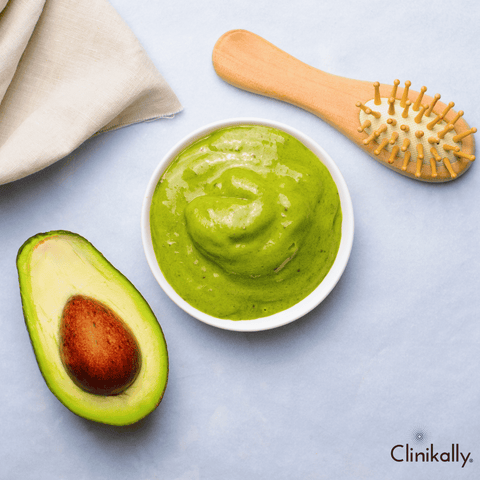
Several herbal extracts have been shown to strengthen and promote healthier hair growth. Here are some herbal extracts commonly used for hair strengthening:
-
Extract of Amla (Indian Gooseberry): Amla extract, which is high in vitamin C and antioxidants, nourishes the scalp, strengthens hair follicles, and promotes hair growth. It also aids in the prevention of premature greying.
-
Ginseng Extract: Ginseng extract, which is known for its stimulating properties, can promote hair growth, strengthen hair follicles, and improve hair strength.
-
Nettle Extract: Nettle extract contains minerals such as silica and sulphur, which are good for strengthening hair strands and encouraging healthy growth. It may also aid in the prevention of hair loss.
-
Horsetail Extract: Horsetail extract contains silica, which helps to strengthen and improve the texture of hair. It may also promote hair growth and decrease breakage.
-
Rosemary Extract: Rosemary extract contains antioxidants that promote scalp health, circulation, and hair growth. It can help to strengthen hair follicles and may help to reduce hair thinning.
-
Burdock Root Extract: Burdock root extract is high in essential fatty acids and phytosterols, which nourish the scalp, strengthen hair, and promote healthy hair growth.
-
Fenugreek Seed Extract: Proteins and nicotinic acid in fenugreek seed extract can strengthen hair strands, prevent breakage, and stimulate hair growth.
These plant extracts are frequently used as ingredients in shampoos, conditioners, masks, and serums for hair treatment. They can also be used in different forms (such as infusions, oils, or masks) in hair care routines or handmade hair treatments. It's crucial to conduct a patch test to rule out any allergies or sensitivities before utilising herbal extracts or products containing these extracts. Furthermore, reactions to herbal extracts might differ from person to person, so it's best to start with small doses and observe how your hair reacts. Together with a healthy diet and appropriate hair care techniques, adding these herbal extracts to your hair care regimen may help strengthen hair and encourage healthier development. Seeking guidance and treatment alternatives from a dermatologist or other healthcare professional can be beneficial if you are experiencing concerns with hair strength or hair loss.
Boost hair health and prevent hair loss safely

It is important to be mindful of the ingredients in your hair care products and avoid those that are known to be harmful. By switching to natural alternatives, you can ensure that your hair is getting the proper care and nourishment it needs to stay healthy and strong. Remember, always read the ingredients label before buying any hair care product, and if you have any doubts or concerns, consult a hair care professional.
Hair care ingredients to avoid during pregnancy
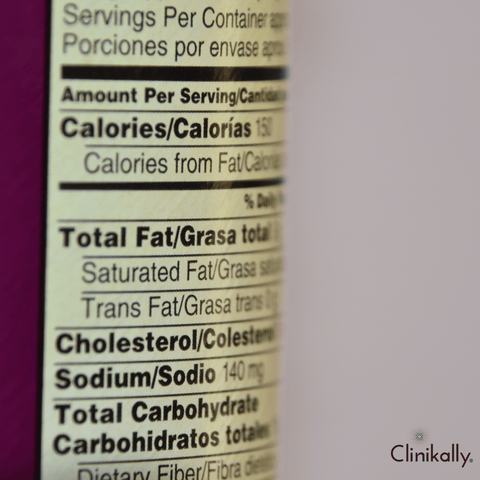
During pregnancy, it is essential to pay extra attention to the ingredients in your hair care products. Many hair care ingredients can be harmful to both you and your baby. Some ingredients to avoid during pregnancy include:
-
Retinoids: Retinoids are derivatives of Vitamin A and are commonly found in anti-aging and acne products. They have been known to cause birth defects when used during pregnancy.
-
Formaldehyde: Formaldehyde is a common preservative used in hair care products, but it can be harmful to both you and your baby. It has been linked to cancer and can cause allergic reactions and skin irritation.
-
Phthalates: Phthalates are a group of chemicals commonly used in hair care products to increase their flexibility and durability. They have been linked to birth defects and reproductive issues.
-
Lead: Lead is a toxic heavy metal that can be found in some hair dyes. It can cause developmental delays and other health problems for both you and your baby.
It is important to always read the ingredients label of your hair care products and avoid those that contain these harmful ingredients. It's also a good idea to consult your healthcare provider for guidance on what hair care products are safe to use during pregnancy or buy them from a trusted digital health platform in India.
Safe ingredients for sensitive scalp
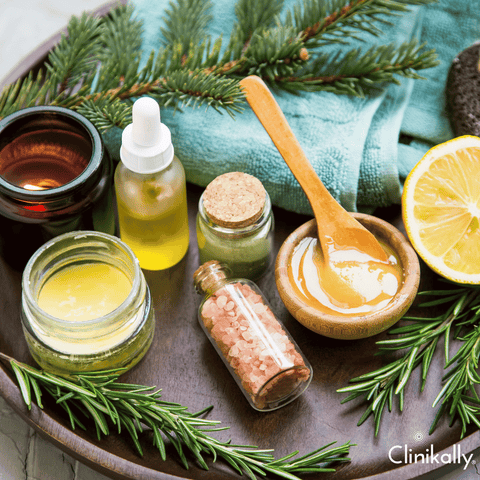
To avoid irritation or discomfort, people with sensitive scalps should use hair care products that contain gentle and soothing ingredients. Here are some ingredients that are safe and mild and are generally well tolerated by sensitive scalps:
-
Aloe Vera: Aloe vera, known for its soothing and moisturising properties, can help soothe and hydrate the scalp, reducing irritation and itching.
-
Chamomile Extract: Chamomile has anti-inflammatory and calming properties, making it ideal for soothing sensitive, irritated scalps.
-
Oat Extract: Oat extract contains compounds that soothe and moisturise the scalp, making it ideal for sensitive or dry scalps.
-
Cucumber Extract: Cucumber is a gentle and hydrating ingredient that provides a cooling sensation that can relieve scalp irritation.
-
Calendula Extract: Because of its anti-inflammatory properties, calendula can help soothe and calm sensitive or inflamed scalps.
-
Panthenol (Provitamin B5): Panthenol is a humectant that helps to moisturise and soothe the scalp without irritating it.
-
Glycerin: A gentle and effective humectant that helps keep the scalp moist without irritating it.
-
Coconut Oil: Known for its moisturising properties, coconut oil can help soothe and hydrate a sensitive scalp when used sparingly.
-
Jojoba Oil: A gentle moisturiser that resembles the natural oils of the scalp, jojoba oil can help calm and hydrate sensitive skin.
-
Shea Butter: Rich in nutrients and fatty acids, shea buttera provides gentle hydration and soothing properties to the scalp.
Look for labels that say "gentle," "hypoallergenic," "fragrance-free," "alcohol-free," or "sulfate-free" when buying hair care products for a sensitive scalp. Avoid products that contain harsh sulphates, parabens, artificial fragrances, and dyes that may irritate sensitive skin.
It is recommended to perform a patch test before using new products extensively to ensure compatibility and avoid adverse reactions. Additionally, for sensitive individuals, sticking to a simple hair care routine and avoiding excessive heat styling or harsh treatments can help minimise scalp irritation. Seeking advice from a dermatologist or other medical expert can offer specific suggestions and direction regarding hair care products that are appropriate for a sensitive scalp.
Vitamins essential for hair growth
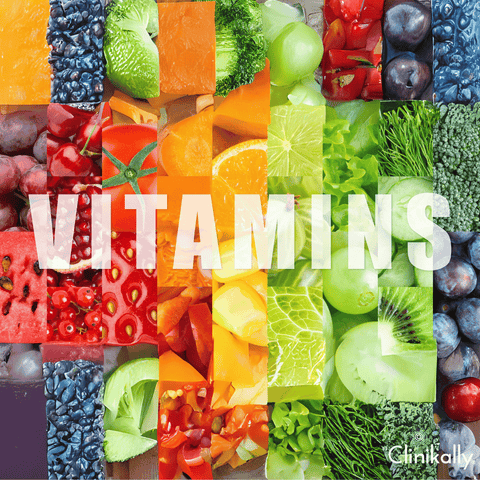
Several vitamins are essential for supporting healthy hair growth and overall hair health. The following are some essential vitamins for hair growth:
-
Vitamin A: Assists in the production of sebum, the scalp's natural oil that moisturises the scalp and keeps hair healthy.
-
Biotin (Vitamin B7): Promotes the production of keratin, a key structural component of hair. Hair thinning or loss can result from a lack of biotin.
-
Vitamin C: An antioxidant that aids in collagen production, which is necessary for hair structure. It aids in the absorption of iron, which is required for hair growth.
-
Vitamin D: Promotes hair follicle cycling and is involved in hair growth regulation.
-
Vitamin E: Promotes a healthy scalp and hair growth by improving blood circulation.
-
Vitamin B Complex (B3, B5, B6, B12): Helps red blood cell formation and ensures proper nutrient delivery to hair follicles, making it essential for overall hair health.
-
Vitamin K: Helps with calcium transport, which can help prevent hair loss.
It is critical to consume a balanced diet rich in different nutrients in order to get these vitamins. These vitamin-rich foods include:
-
Vitamin A, which can be found in eggs, liver, sweet potatoes, carrots, and spinach.
-
Eggs, avocados, nuts, seeds, and sweet potatoes are good sources of biotin.
-
Broccoli, bell peppers, kiwis, berries, and citrus fruits are good sources of vitamin C.
-
Sunlight exposure, fortified foods, and fatty fish (salmon, mackerel) are good sources of vitamin D.
-
Vitamin E can be found in avocado, spinach, almonds, sunflower seeds, and olive oil.
-
Whole grains, meat, fish, poultry, dairy products, legumes, and leafy greens are good sources of vitamin B complex.
-
Leafy greens (broccoli, spinach, kale), Brussels sprouts, and fermented foods are good sources of vitamin K.
If your diet is deficient in these vitamins, you may consider taking supplements, but it is advisable to speak with a healthcare provider before beginning any supplementation programme. Certain vitamins can have negative consequences if taken in excess. Healthy living, appropriate hair care techniques, and a diet high in these vital vitamins can all help to promote healthy hair growth and general hair health.








































